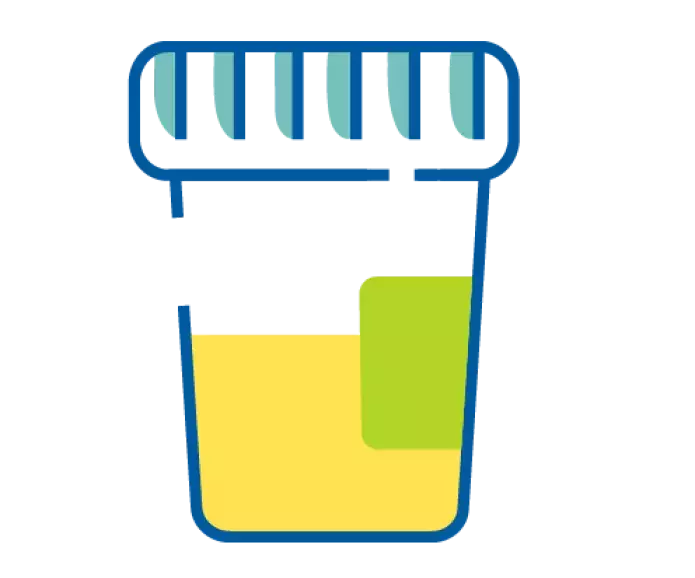
Artículo
Los análisis de orina
- Revisión médica de
- AKF's Medical Advisory Committee
- Última actualización
- May 20, 2025

¿Qué son los análisis de orina?
Un análisis de orina consiste en que el médico examina la orina (el pis) en busca de sustancias (por ejemplo, las proteínas o la sangre) que pueden indicar la presencia de una enfermedad renal u otros problemas médicos. Haciendo análisis periódicos se puede obtener una visión general de cómo evoluciona la salud renal. Es de especial importancia para quienes tienen factores de riesgo de enfermedad renal, como la diabetes, la presión arterial alta o la insuficiencia cardíaca.
¿Para qué se usan los análisis de orina?
Los análisis de orina ayudan al médico a:
- Medir la función renal
- Determinar en qué etapa de enfermedad renal está la persona
- Dar seguimiento a problemas médicos que causan enfermedad renal, como por ejemplo la diabetes
- Ver si hay complicaciones (problemas) de la enfermedad renal, como por ejemplo la anemia y la acidosis metabólica
- Ver si hay otros problemas, como por ejemplo una infección renal o una infección de las vías urinarias (IVU)
- Determinar la concentración de proteínas
Los riñones depuran toda la sangre del cuerpo y retiran en forma de orina el exceso de agua y los productos de desecho. Cuando los riñones están dañados, no depuran la sangre como es debido. Una de las señales más tempranas de ese daño puede ser la presencia de proteínas en la orina. Con un análisis de orina se puede hacer una detección temprana de la enfermedad renal, antes de que el daño renal sea severo. Repitiendo el análisis de orina a lo largo del tiempo, el médico puede ver si está empeorando el daño renal.

Cociente albúmina/creatinina urinario (UACR):
El cociente albúmina/creatinina urinario (UACR) es una prueba que mide la cantidad de albúmina (un tipo de proteína) que hay en la orina con respecto a la concentración de creatinina Este cociente ayuda a los médicos a determinar qué tan bien funcionan los riñones. La prueba del UACR se usa a menudo para detectar daño renal temprano, sobre todo en las personas de riesgo elevado (por ejemplo, las que tienen diabetes o presión arterial alta).
¿Cuáles son los diferentes tipos de análisis de orina?
Los médicos usan análisis diferentes para investigar cada cosa:
- Examen visual: Los médicos inspeccionan la muestra de orina para:
- Ver su color; si la orina tiene un color amarillo oscuro o café, puede ser señal de problemas.
- Ver si está espumosa, turbia o tiene un aroma inusual, lo que pueden ser señal de problemas.
- Examen microscópico: Los médicos ven una pequeña cantidad de orina al microscopio en busca de señales de problemas; por ejemplo:
- Bacterias, que podrían deberse a una infección.
- Cristales, que podrían ser señal de la presencia de piedras en el riñón.
- Glóbulos rojos o blancos, que podrían ser señal de infección o de otros problemas renales.
- Prueba con tira reactiva: Los médicos sumergen en la orina una delgada tira plástica que mediante cambios de color indica los niveles de:
- Sangre, lo que puede ser señal de problemas como las infecciones.
- Proteínas, lo que puede ser señal de enfermedad renal.
- Glucosa (azúcar), lo que puede ser señal de diabetes si la concentración es elevada.
- Acidez (pH), que en niveles anormales puede ser señal de problemas como las infecciones de vías urinarias.
- Cociente albúmina/creatinina urinario (UACR):
- El cociente albúmina/creatinina urinario (UACR) es una prueba que mide la cantidad de albúmina (un tipo de proteína) que hay en la orina con respecto a la concentración de creatinina Este cociente ayuda a los médicos a determinar qué tan bien funcionan los riñones. La prueba del UACR se usa a menudo para detectar daño renal temprano, sobre todo en las personas de riesgo elevado (por ejemplo, las que tienen diabetes o presión arterial alta).
- Es un análisis de orina sencillo:
- La persona entrega una pequeña muestra de orina (equivalente a unas dos cucharadas).
- La muestra de orina se envía al laboratorio para determinar la cantidad de albúmina (la proteína más abundante en la sangre) y de creatinina (un producto sanguíneo de desecho procedente de los músculos).
- Relacionando esas cantidades, el médico determinará el UACR.
- Si su UACR es mayor de 30 mg/g, pregúntele al médico cuándo debe repetirse el análisis. Haciendo periódicamente la prueba del UACR se puede ver cómo evoluciona la salud renal.
- Es un análisis de orina sencillo:
- El cociente albúmina/creatinina urinario (UACR) es una prueba que mide la cantidad de albúmina (un tipo de proteína) que hay en la orina con respecto a la concentración de creatinina Este cociente ayuda a los médicos a determinar qué tan bien funcionan los riñones. La prueba del UACR se usa a menudo para detectar daño renal temprano, sobre todo en las personas de riesgo elevado (por ejemplo, las que tienen diabetes o presión arterial alta).
- Urocultivo: Si tiene una infección renal o una IVU, el urocultivo puede revelar el tipo de bacteria que está presente.
- El análisis de orina de 24 horas mide la función renal general mediante toda la orina que la persona produce en 1 día. Este análisis brinda información detallada sobre la capacidad de los riñones para depurar los desechos, sobre todo cuando se determina la proteinuria (la presencia de demasiadas proteínas en la orina), que es un indicador clave de la salud renal. Los médicos suelen pedir un análisis de orina de 24 horas cuando necesitan información más detallada que la que ofrece el análisis general de orina. Además, pueden determinarse otros factores (como las proteínas, la creatinina, el calcio y otras sustancias importantes) para ofrecer un panorama integral de la función renal.
- Para hacer este análisis, el médico le entregará uno o dos recipientes grandes en los que depositar toda la orina que produzca a lo largo de 24 horas. También le dará una charola especial que se acopla al escusado o a un orinal para recolectar la orina. A continuación, usted verterá la orina de la charola al recipiente. He aquí un posible ejemplo de lo que hará:
- Al despertarse, descartará la primera orina.
- A partir de ese momento empezará a recolectar la orina de las siguientes 24 horas mediante la charola y el recipiente (en todo ese tiempo no perderá la orina por el escusado). No debe orinar directamente al recipiente.
- Conserve el recipiente en el refrigerador o sobre hielo hasta su envío al laboratorio.
- Al cabo de 24 horas lo llevará al laboratorio, donde analizarán la orina para determinar:
- La cantidad de orina producida en 1 día
- La acidez (qué tanto ácido contiene la orina)
- La cantidad de ciertas sustancias, como:
- Las proteínas
- La creatinina
- El calcio
- El sodio
- Él ácido úrico
- El oxalato
- El citrato
Pregunte a su médico con qué frecuencia debe hacerse este análisis.
- Prueba de la nefrina: La prueba de la nefrina es un análisis de orina (pis) que podría permitir la detección temprana del daño renal. Se están haciendo estudios con vistas a determinar la utilidad de la prueba de la nefrina en la detección del daño renal. En la prueba de la nefrina se analiza la orina en busca de una proteína llamada nefrina.
¿Qué sucede en un análisis de orina?
Para un análisis de orina, usted orinará (es decir, hará pis) en un recipiente con tapa que le entregará el médico. El análisis de orina podría hacerse en el consultorio del médico, pero también es posible que el médico le entregue unos recipientes de muestreo de orina y unas toallitas estériles para que recolecte la orina en su casa.
Para asegurar que la muestra de orina no se contamine, use el método de obtención de orina limpia:
- Lávese las manos con agua y jabón.
- Con una toallita estéril, limpie la zona de alrededor del lugar por el que sale la orina.
- Comience a orinar en el inodoro.
- Interrumpa el chorro de orina y a continuación orine en el recipiente.
- Cuando ya esté lleno el recipiente, termine de orinar en el inodoro.
El médico debe revisar los resultados del análisis de orina y comentarlos con usted. Si no comprende el significado de los resultados del análisis de orina en relación con su enfermedad renal o no sabe qué debe hacer a continuación, consulte sus dudas.
A continuación le sugerimos preguntas útiles que puede hacerle a su médico:
- ¿Había proteínas en mi orina?
- ¿Qué significa el resultado de mi cociente albúmina/creatinina urinario para mi salud renal?
- ¿Cuándo debo hacerme el próximo análisis de orina?
- ¿Qué medidas puedo tomar para impedir que avance el daño renal?
- ¿Qué tratamientos o modificaciones del estilo de vida me recomienda a la luz de los resultados de mis análisis?
- ¿Encaja este resultado analítico con los resultados de mi eGFR o de otras pruebas de función renal?
¿Qué riesgo tengo de terminar presentando falla renal?
¿Hay algo que tenga que hacer antes de un análisis de orina?
Por lo general, antes de un análisis de orina se puede comer y beber con normalidad. Si van a hacerle al mismo tiempo otros análisis (por ejemplo, análisis de sangre), el médico le indicará cómo prepararse.
Informe al médico de todos los medicamentos, vitaminas o suplementos que toma, ya que pueden alterar los resultados de los análisis de orina.

Cuando los riñones se dañan, una de las primeras señales puede ser la presencia de proteínas en la orina. Con un análisis de orina se puede hacer una detección temprana de la enfermedad renal, antes de que el daño renal sea severo. Repitiendo el análisis de orina a lo largo del tiempo, el médico puede ver si está empeorando el daño renal.

